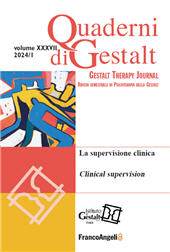Dialogando sulla supervisione : dalla tecnica alla relazione
13-26 p.
In questo articolo Rezeda Popova, una psicologa psicoterapeuta della Gestalt e direttrice dell'Istituto del Kazan, intreccia il pensiero di Pablo Herrera Salinas (Cile), Bertram Müller (Germania) e Peter Schulthess (Svizzera), tre didatti internazionali che hanno una lunga esperienza nell'ambito della supervisione e della formazione. Rispondendo alle domande poste dalla curatrice, disegnano un ricco scenario di prospettive e intuizioni utili sia per i teorici del metodo gestaltico che per i professionisti di questa pratica fondamentale della formazione e della professione. Ciascun autore ci offre l'unicità della propria esperienza e delle proprie competenze, attraverso riflessioni preziose sul ruolo della supervisione nella psicoterapia della Gestalt. Gli autori restituiscono anche aspetti di criticità sui quali sarà importante riflettere per rendere il processo della supervisione un percorso non solo tecnico, ma anche relazionale ed etico. [Testo dell'editore].
The purpose of this dialogical article is to draw attention of a professional audience to the role and place of supervision in contemporary Gestalt therapy, to raise questions related to its characteristics, complexities, and contradictions, and to highlight potential developmental prospects.rticle presents the dialog between the editorial team and three experienced Gestalt therapists with extensive supervision practice: Peter Schulthess, Bertram Müller, and Pablo Herrera Salinas, who respond to the questions on supervision in Gestalt therapy. answers allow a rich tapestry of perspectives and insights on the topic. The therapists brought their own unique experiences and expertise to the discussion, offering valuable reflections on the role of supervision in Gestalt therapy.
The article particularly emphasises the importance of relational dynamics in supervision and accentuates the parallels between therapy and supervision, advocating for a holistic approach that integrates personal aspects into the supervisory process. It draws the reader's attention to Gestalt terminology, the nuances of language and concepts (such as the self, personality-function, diagnostic assessments, etc.), and brings a focus on practical considerations in supervision, stressing the need for structured approaches to supervision, especially for novice therapists.nificant part of the discussion is devoted to the topic of shame and vulnerability in both supervisee and supervisor. Strategies for minimising a fear of judgment, recognising shame, and fostering opportunities for growth are explored. In conclusion, "blind spots" and areas for further analysis are illuminated. Notably, there is a need for more literature and theoretical framework concerning the relational Gestalt approach in supervision.
Additionally, research on the effectiveness of clinical supervision in enhancing client outcomes is identified as essential, suggesting a call for the evaluation and refinement of supervision practices. [Publisher's Text].
-
Artikel aus derselben Ausgabe (einzeln erhältlich)
-
Informationen
ISSN: 2035-6994
KEYWORDS
- Supervisione, psicoterapia della Gestalt, teoria del campo organismo/ambiente, il contatto
- Supervision, Gestalt therapy, theory of organism/environment field, the selfcontact


